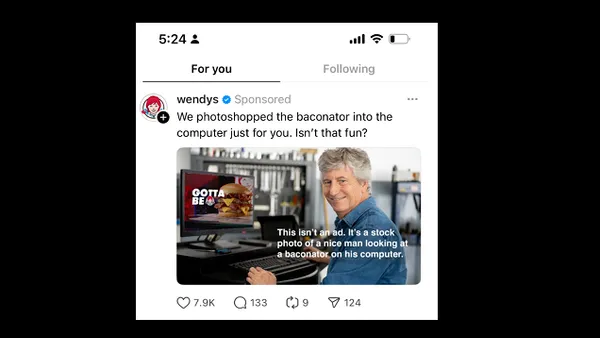Dive Brief:
- Marketers worldwide tend to prefer advertising on established digital platforms such as YouTube, contrasting with consumer sentiment that's generally more positive about advertising they see on newer platforms like TikTok, Kantar found in a study shared with Marketing Dive. Social video app TikTok was No. 1 globally in Kantar's ranking of consumer preferences for digital ad platforms, followed by Instagram, Snapchat, Google and Twitter.
- Consumers preferred channels for advertising are, in order: cinema ads, sponsored events, magazine ads, digital out-of-home and newspapers. Within the marketing industry, the favored ad channels are online video, TV, social media news feeds, streaming TV and social media stories.
- YouTube, Instagram, TikTok and Google are most likely to benefit next year as marketers boost their allocations to digital video. The survey found that linear TV will bounce back, along with digital out-of-home, while offline channels like newspapers, magazines and cinema will face challenges. Kantar surveyed 4,000 consumers and more than 700 senior marketers worldwide.
Dive Insight:
Kantar's research suggests marketers may be over reliant on digital channels for ads, as consumers tend to prefer offline channels overall because these are perceived to be better quality, more trustworthy, less intrusive and not overly targeted, per the report. When it comes to digital, people prefer newer platforms. These findings are at odds with marketers, who prefer digital channels overall, and the more established ones within the space. This could be because on digital, it's easier to access the kind of data that can help marketers target ads, optimize campaigns and show ROI.
Despite the analytics capabilities endemic to digital channels, it's getting harder for marketers to determine where ads should be placed for the greatest success, Kantar found. As such, the findings suggest marketers should pay closer attention to consumers' tastes with an eye toward finding the right balance of digital and offline.
"The rush to digital is understandable because of targeting and measurement capabilities, but saturation, repetition and over-targeting in some environments can make this counterproductive," Duncan Southgate, global brand director of media at Kantar, said in a statement. "Advertisers and agencies need to develop a more quantified understanding of 'medium as message' and the impact different media channels and platform choices can have on their brand goals."
For media platforms, the findings signal a need to keep both advertisers and consumers in mind when crafting new ad innovations so they meet marketers' needs while providing entertainment, Southgate said.
Kantar's study also indicates that marketers are becoming more resourceful, with 60% of survey respondents saying they had cut marketing spend while 30% described the decrease as "a lot." Media consumption habits have changed drastically during the pandemic, making digital platforms a bigger priority for marketers. They plan to increase their allocations to digital channels including online video, social media, display, branded content, streaming and podcasts, the survey found.
While consumers are more receptive to ads on new formats like TikTok, it's understandable that marketers prefer established platforms like YouTube that have a longer history, larger audiences, more audience data and relationships with ad tech providers. However, Kantar's finding suggests marketers may be missing out on reaching viewers who are more amenable to seeing ads on TikTok than on YouTube. The difference may indicate that TikTok currently is less cluttered, which could change as the app builds out its ad platform over time.
For U.S. marketers, any opportunity with TikTok could be dampened by the considerable doubt surrounding the app's future amid political and corporate squabbles over the app's future ownership. The Trump administration has threatened to ban TikTok in the U.S. because of national security concerns, leading the app's Chinese parent company ByteDance to negotiate a sale. President Trump had tentatively approved a deal that would give U.S.-based companies and investors a controlling stake in TikTok. However, the deal has been marred by conflicting claims over TikTok's future ownership structure and disapproving remarks by the Chinese government's media mouthpiece. Until there's greater reassurance that TikTok won't be banned in the U.S., marketers are likely to avoid committing significant media dollars to the platform.














